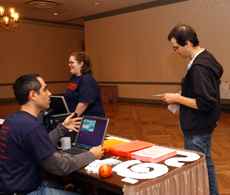Security Day spreads consumer savvy

Shira Weissman
October 26, 2004
Resources to diagnose, fix and spread awareness of computer security problems were available to University students and staff Monday at the Illini Union. These services were offered as part of the first Fall Computer Security Day, an event sponsored by Campus Information Technologies and Educational Services (CITES).
Leslie Rankin, a CITES security support specialist, said the goal was to make people aware of the essentials in keeping a computer safe from viruses, spyware and password theft.
“We want people to become more knowledgeable about how to take care of computers,” Rankin said. “Ninety-nine percent of security is awareness.”
Rankin mentioned four basic steps in keeping a computer secure – installing and updating anti-virus software, keeping an operating system updated, choosing good passwords that are kept private and becoming a savvy computer user.
She said one major problem people can avoid by following these steps is password theft.
Get The Daily Illini in your inbox!
“One of the biggest complaints is that there are too many passwords for different programs to manage, and it’s hard to remember what password goes with what program,” Rankin said. “As a result, one thing people will often do is write passwords on post-it notes and stick them by their computers – that definitely isn’t safe.”
Password Vault, a free program that can be used to store and organize passwords, usernames and other data, was introduced at the event.
“We recently got a license for it and have made it available on the CITES Web store,” she said. “It’s a secure way people can be reminded of all their different passwords.”
Mark Hart, a security officer for CITES, detected and fixed problems with computers that people brought in for the event.
“We’re helping get viruses off and keeping things up-to-date,” Hart said. “We’re doing what we can to help people who have some pretty serious computer issues.”
Graduate student Lori Kae Schwab said she decided to bring her computer in to be fixed when she found out about computer security day.
“It really helps to have someone sit down with you and explain the problems,” Schwab said. “They walked me through everything, which is really good for someone like me who isn’t computer savvy.”
Lynnell Lacy, coordinator of CITES training programs, gave out information on free computer security courses offered by the CITES faculty and staff technology training team.
“We teach courses at all levels, but our most popular course deals with the basics – it teaches patching and preventing viruses,” Lacy said.
Rankin said one of the biggest complaints students had with computer security was having to deal with viruses.
“If a student is not computer savvy, they will probably not be able to distinguish between a real, safe e-mail and one that is forged and made to look like it’s from University administration or a real company,” she said.
Rankin said a computer security day is planned to take place once every semester, and she said she hopes it will develop to more effectively fit the needs of students and staff.
“In the future, I’d like to have more speakers to address different audiences, such as ones targeted for students and ones for staff,” she said.
Rankin also said she hoped the event would teach that computer security is personal, because the health of an individual’s computer can directly affect everyday life.
“Your life is on that machine,” she said. “In order to keep you running, you have to take the proper steps to keep it running.”






